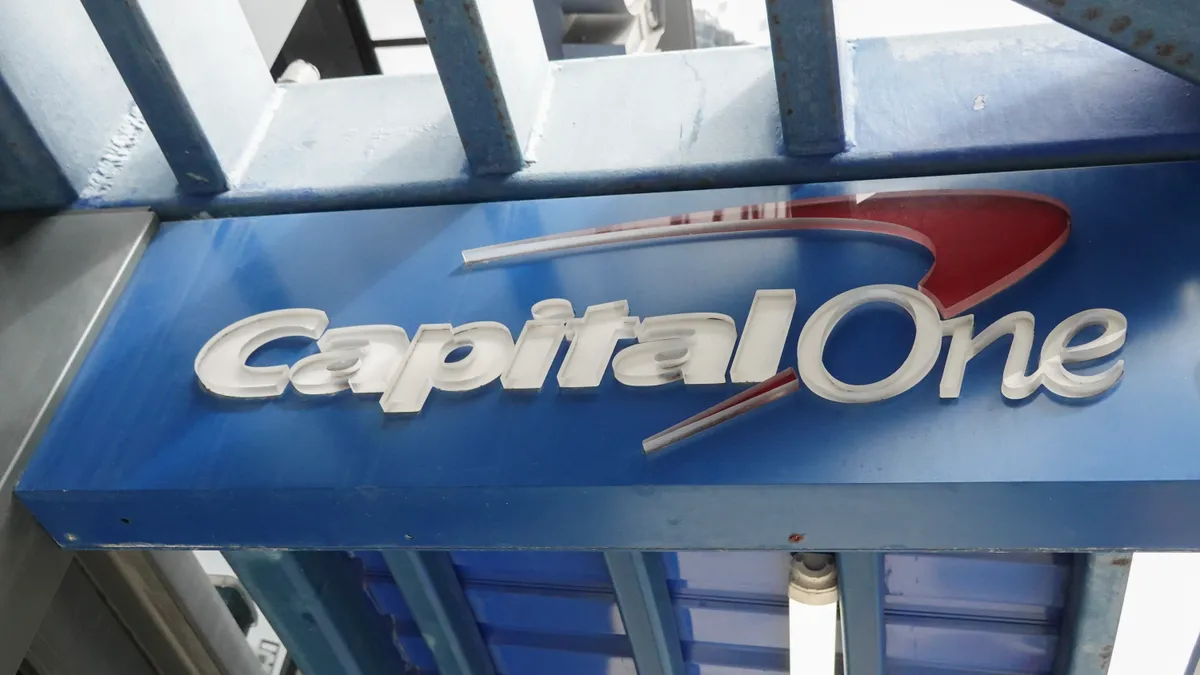Dive Brief:
- Capital One is bracing for a “significant” undertaking in resolving compliance issues at Discover Financial Services as it plans for an acquisition of the card network company, Capital One CEO Richard Fairbank said Tuesday.
- “We are making the assumption this will be a really significant amount of work,” Fairbank said Tuesday in response to an analyst’s questions during KBW’s 2024 Fintech and Payments Conference. “We won’t inherit their enforcement action, but we inherit very much the same challenge and necessity to really, really bring them to a very different place with respect to compliance and risk management.”
- On top of the at least $500 million Discover has said it expects to spend on compliance this year, Capital One executives expect to make further regulatory and compliance investments, Fairbank said. The McLean, Virginia-based bank projects it will spend $2.8 billion in integration costs following the deal’s closure, Capital One CFO Andrew Young noted Tuesday.
Dive Insight:
Capital One announced last week it’s purchasing Discover for $35.3 billion, with the companies projecting the deal to close late this year or early next.
Discover’s compliance spending has soared as the company grapples with regulatory scrutiny over multiple issues. The company also spent nearly $500 million on compliance last year.
Riverwoods, Illinois-based Discover reached a consent agreement with the Federal Deposit Insurance Corporation last September in connection with a consumer compliance probe at its subsidiary, Discover Bank. Discover also disclosed a card misclassification issue last July that affected merchants and merchant acquirers, and the Securities and Exchange Commission is investigating that issue.
In addition, the company encountered regulatory troubles related to its student loan business, which it’s now seeking to sell.
“It’s a very challenging thing to take on a significant set of enforcement actions like this and what comes along with that,” Fairbank said Tuesday of Discover’s situation. “It’s part of a journey that pretty much every bank has gone through.”
“We assume it is a lot of work,” and it tends to be more involved than those currently in the thick of it might think, he added. “These can be very big undertakings.”
Because Capital One is mainly acquiring businesses in areas it already operates in, it’s largely a matter of taking Discover’s issues and bringing them under Capital One’s risk management and compliance umbrella, Fairbank said. One exception is that Capital One doesn’t have a network business, so “that one, we’ll have to build a little bit more from the ground up,” he said.
Ultimately, we’re “taking the over, in terms of cost and time,” to fully address Discover’s compliance issues, Fairbank said.
Capital One is in a strong position to handle Discover’s compliance concerns, due to the investments Capital One has made in technology, talent and processes to handle risk management at scale, Fairbank said.
Regulators might agree and prefer Capital One handling Discover’s compliance issues, Oppenheimer analyst Dominick Gabriele wrote in a Feb. 20 note to investor clients.
Capital One has a bigger capital base to absorb any potential costs such as penalties, Gabriele said in an interview. “It’s also a fresh face,” he added. An outsider “can kind of arbitrate the situation,” and Capital One will want to resolve the issues as soon as possible, he said.
A combined institution will have more resources, which holds appeal for banks since the fixed costs of dealing with regulators have increased, noted Brian Graham, a partner at advisory firm Klaros Group.
“There is an argument to be made that an organization with more resources can hire even more people, and better people, and attract the right kinds of folks to tackle whatever the compliance obligations are,” Graham said.
Notably, Discover executives ducked out of scheduled conference appearances this week, with the company’s investor relations team citing the acquisition for their absences.











